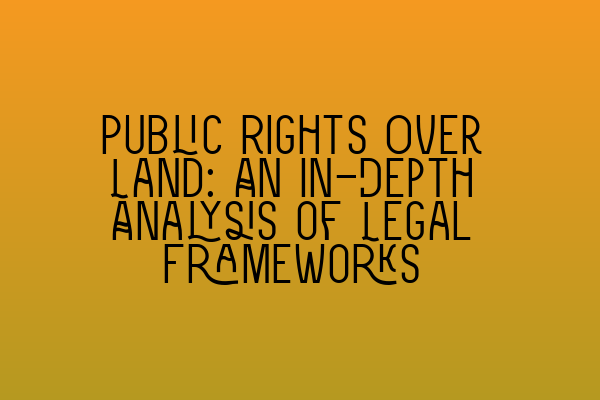Public Rights Over Land: An In-Depth Analysis of Legal Frameworks
Welcome to the SQE Property Law & Land Law blog, where we dive deep into various topics related to property law and land law. In this article, we will be exploring the fascinating and complex area of public rights over land. Understanding these legal frameworks is crucial for property owners, developers, and anyone involved in land-related matters. So, let’s get started!
Public rights over land refer to the legal rights that are granted to the general public to access and use certain areas of land. These rights play a significant role in ensuring equitable and fair access to public spaces, promoting community engagement, and protecting public interests.
The Legal Basis of Public Rights Over Land
The legal frameworks governing public rights over land are rooted in centuries of common law principles and statutes. There are several types of public rights over land, each with its own legal basis and requirements. Let’s explore the most common ones:
1. Public Footpaths and Bridleways
Public footpaths and bridleways are rights of way that allow the general public to pass through private land on foot or horseback. These rights are often established through ancient custom, historical evidence, or statutory provisions. Public footpaths and bridleways are essential for recreational activities, such as hiking, walking, and horse riding.
If you would like to learn more about contractual law and its implications, make sure to check out our article on Misrepresentation in Contracts: Unveiling Deceptive Practices.
2. Public Highways
Public highways refer to roads and pathways that are maintained by public authorities and are open to the public for vehicular and pedestrian use. These rights of way are typically established through historical usage and dedication. Public highways are crucial for transportation and accessibility, ensuring smooth movement of people and goods.
If you are preparing for the SQE Contract Law exam, our comprehensive guide on the SQE Contract Law syllabus will be extremely helpful. Check it out here.
3. Public Parks and Open Spaces
Public parks and open spaces are land areas that are designated for public use and enjoyment. These areas are typically owned and maintained by local authorities and are open to the public without any restrictions. Public parks provide recreational opportunities, promote physical and mental well-being, and enhance community cohesion.
Interested in learning about landmark cases and influential judicial decisions related to contract law? Don’t miss our article on SQE Contract Law: Analyzing Landmark Cases and Influential Judicial Decisions.
4. Public Navigable Rivers and Waterways
Public navigable rivers and waterways grant the public a right to navigate, fish, and engage in other lawful activities on natural or artificially created water bodies. These rights are typically based on historical usage, common law, or specific legislation. Public navigable rivers and waterways are important for transportation, recreation, and commerce.
Understanding contractual capacity, rights, and limitations is crucial in property law. Learn more in our article Understanding Contractual Capacity: Rights and Limitations.
Challenges and Limitations
While public rights over land are essential for promoting public interests, they can sometimes clash with private property rights. This can lead to disputes and legal challenges. Balancing the needs and rights of the public with those of private landowners requires careful consideration and legal expertise.
If you are preparing for the SQE Contract Law exam or simply want to test your knowledge, check out our interactive SQE mock tests for contract law here.
Additionally, it is important to note that public rights over land may vary depending on jurisdiction and specific local regulations. Consulting with a knowledgeable property law solicitor is crucial to ensure compliance with the applicable legal frameworks.
Conclusion
In conclusion, public rights over land play a significant role in ensuring equitable access to public spaces, promoting community engagement, and protecting public interests. Understanding the legal frameworks governing these rights is crucial for property owners, developers, and anyone involved in land-related matters.
If you have any questions or need expert advice on public rights over land or any other property law and land law matters, don’t hesitate to reach out to SQE Property Law & Land Law. Our team of experienced solicitors are here to help.
